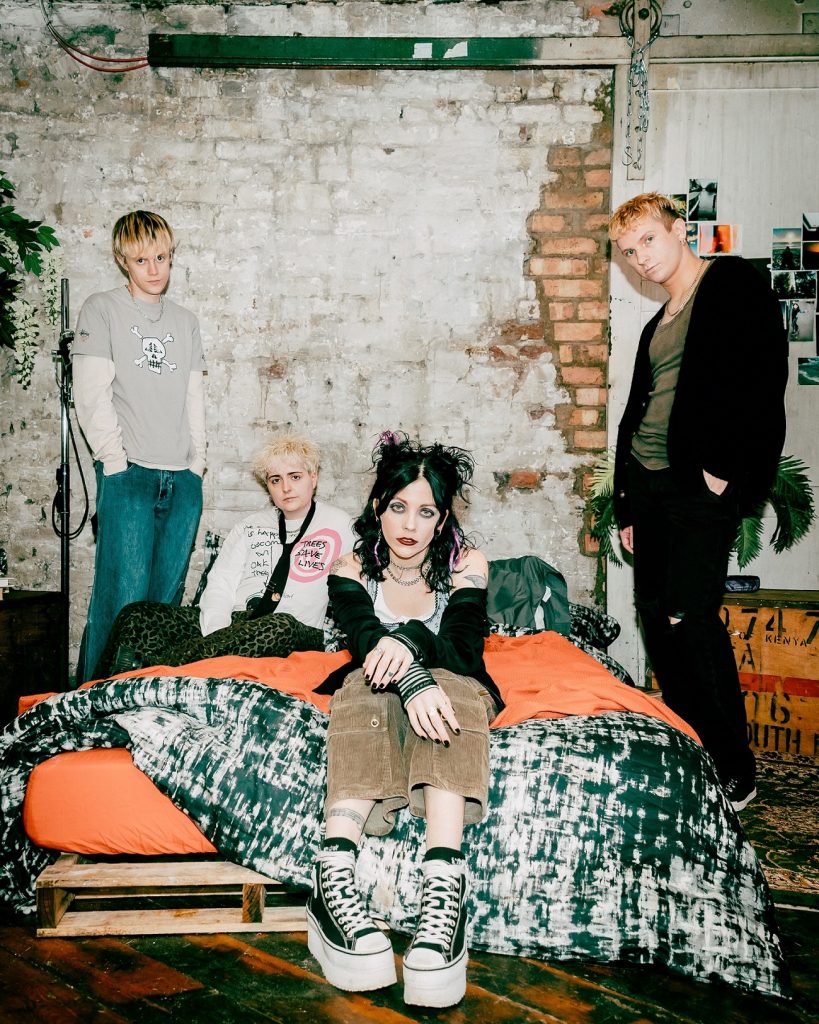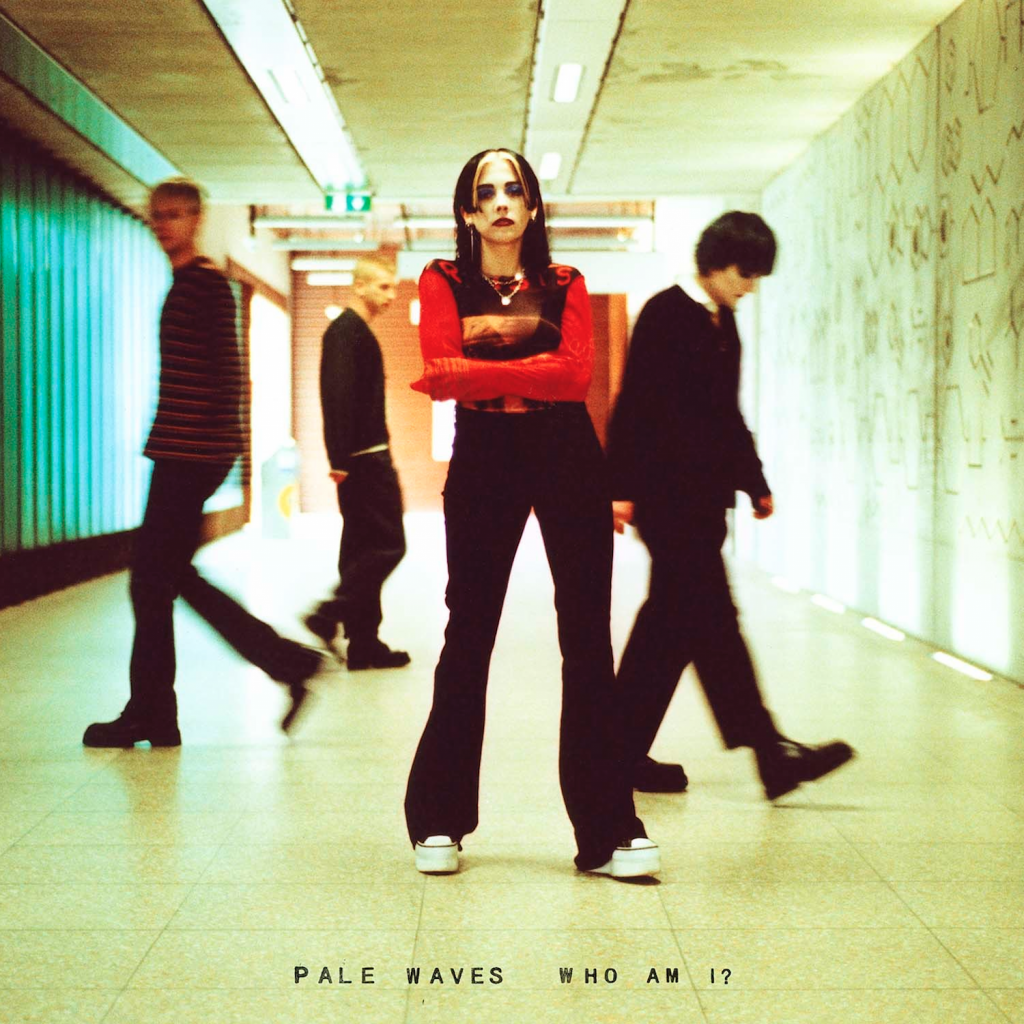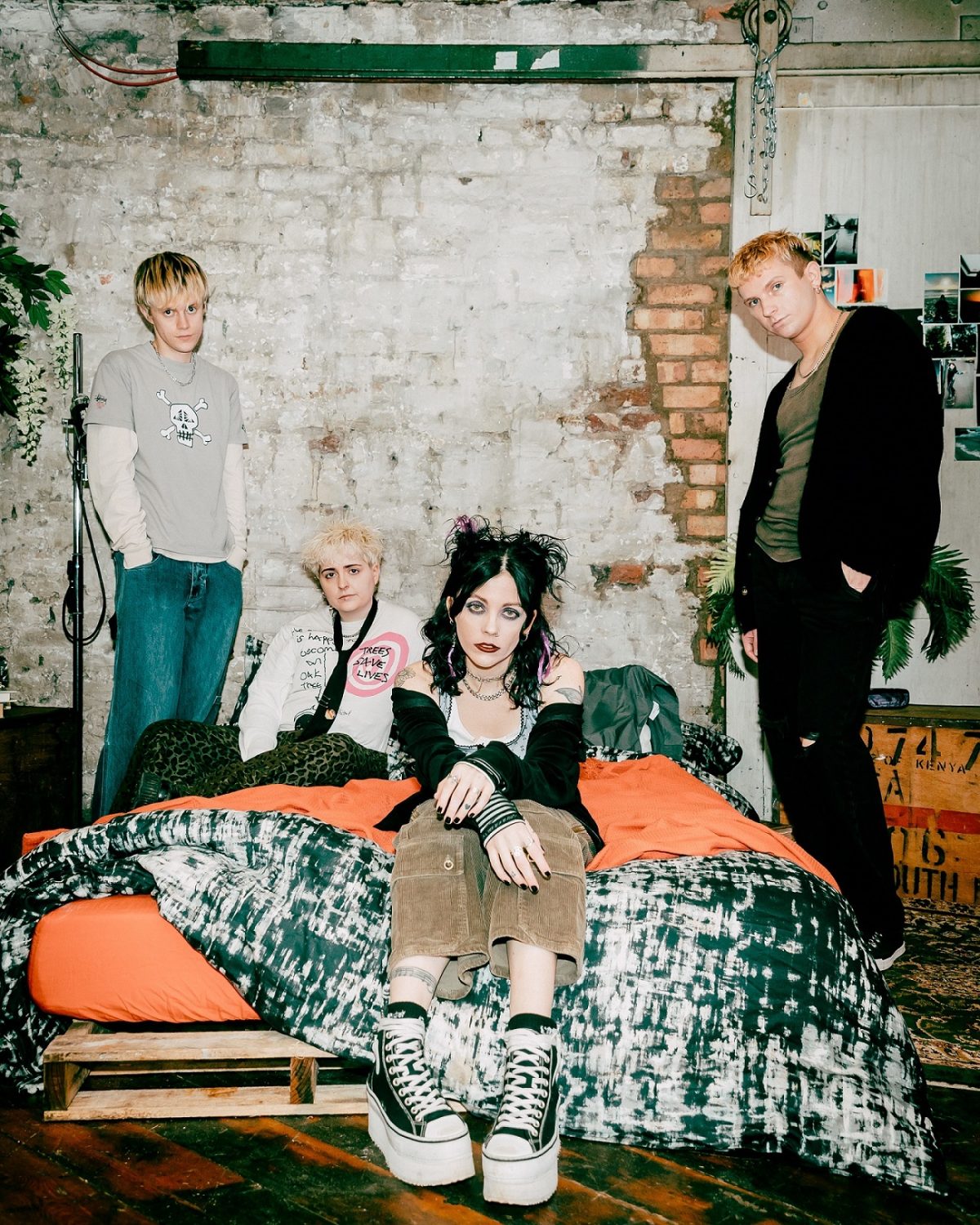
Pale Waves make the kind of shimmery, challenging pop music that draws you in after one listen and that nails the trick of feeling familiar and brand new at the same time. Sophomore albums have tripped up many a band, but not this U.K. quartet. On Who Am I? (Dirty Hit), the band—vocalist/guitarist Heather Baron-Gracie, guitarist Hugo Silvani, bassist Charlie Wood and drummer Ciara Doran—effortlessly tackles subject matter ranging from relationships to identity to personal well-being, all wrapped up in a tougher and more muscular guitar sound than 2018 debut My Mind Makes Noises.
MAGNET spoke with frontwoman Baron-Gracie about the new album, self-acceptance and playing with Phantoms.
First off, Who Am I? is great. Talk a bit about your songwriting process. The earworm choruses sound effortlessly constructed yet likely weren’t. Do you work out melodies first and then lyrics or vice versa?
You know, it actually was kind of an easy process. That makes me sound full of myself to be like, “Yeah, it was easy to write the songs,” but it was really natural, and a lot of the songs only took, like, four hours! I worked with a really amazing writer/producer from New Zealand (Sam De Jong); we wrote most of the album together as a collective. As two people together, we just bring out the best sides of each other, and I think that really enabled my songwriting to step up to the next level. He brought out a lot of amazing parts I wasn’t aware that I had and made them stronger. So, it was really natural, and it wasn’t that tough, actually. It just spilled out of me, and I didn’t want it to stop! I felt like I had another 20 songs in me, but my record label told me it was time to record.
As reflected by the title, you explore a lot of different personal subjects on the album, from being in love to identity. I was particularly impressed that you address aspects of mental health and well-being on a song like “Tomorrow.” That’s a topic that receives even less popular attention than sexuality, Is it fair to say you’re trying to convey that being or feeling imperfect isn’t uncommon and that self-acceptance and forgiveness are important?
Yeah, definitely! I feel like, as a society, we can try and pretend that our lives are fabulous and perfect. You know, we just bought this new shiny car, or we’re on the beach, and we have no troubles in the world, and that’s just, you know—it’s bullshit! Everyone’s going through something. Nothing’s perfect, and I feel like the more people are truly open and honest, the less pressure there will be on everyone. And people’s mental health won’t be as bad because they don’t feel like they have all these comparisons to these people who have perfect lives. I just felt a responsibility of, you know, being a decent human being and admitting that I feel like my life isn’t perfect, nor am I perfect. I’m far from perfect. I just want to be real.
I recently interviewed a fantastic all-women Japanese hard-rock band called BAND-MAID. The comments about them online are positive but do include the occasional note of surprise: “And they even play their own instruments!” A song like “You Don’t Own Me” speaks to being true to one’s self but also perhaps freedom from other’s expectations about what’s “proper” or how others think you should act based on gender or appearance. Have you run into that from a musical perspective where people expect Pale Waves to sound a certain way going by the group’s image? I see the Avril Lavigne comparisons posted online, but in my “OK Gen-Xer” way, I would’ve said Siouxsie Sioux!
I experience that much too often. People look at me and think I look like a scary vampire and expect us to play hardcore rock music. Say we’re doing a photo shoot, and maybe it’s on the street or something—we’ve done a fair few of them around London because it has its English charms. The amount of people who will pass and look at me and go, “You’re in a rock band, aren’t ya? Do you do screamo?” I’m like, “No, actually, it’s purely pop music,” and they’re so shocked. I mean, you can look at all of our YouTube videos. There are people saying we “goth-baited” them and that we shouldn’t be playing this kind of music and looking this way. It’s like, “Wow, why are we still trying to put people in boxes? Can I not wear eye shadow and have black hair and play a fucking pop song?” I didn’t know I had to look a certain way to sing a pop song. If I want to look like a moody vampire, let me!
I understand COVID interrupted recording and the band had to record some parts separately. It’s probably never been easier to do that technically, but your three fellow musicians are all such strong players and complement one another. It must have been challenging not recording as a unit. Talk a little about how the album came together. It still sounds cohesive, and I’m a sucker for that ethereal, reverb-drenched guitar on “Easy.”
Some people think that all four members were, like, dotted everywhere and sent their own instruments from wherever they were in the world, but Ciara was in L.A. with me. They would come in and record the drums whenever they were needed and then come in and stop by the studio, you know, to figure out how it sounded. And then Charlie recorded all of his bass parts with his best friend back in his hometown, and he would send over all the parts. And Hugo—I don’t think he sent over or had to send over any parts because he did all the tricky parts before the pandemic really hit us. So, it actually wasn’t that bad. It was an inconvenience, because it took the life out of things, and it wasn’t a full-band recording a record. You know, we were in two different countries, but it wasn’t really challenging necessarily. We just got it done.
As someone who owns a Vox Phantom VI, I love that you play them. They’re undoubtedly cool-looking guitars. I’ve always imagined that if Dracula were a guitarist, the Phantom would be his axe of choice. For all the gearheads out there, do you favor any of the various reissues or vintage? What drew you to that instrument, and do you pair it with a Vox amp? The originals are not necessarily known as “players,” as the necks are a bit fiddly.
You know, I don’t pair it with a Vox amp, actually. I have a Fender amp. It was actually Matty from the 1975 who gave me a Vox Phantom 12-string as a birthday gift. I remember thinking, “Oh my god, this is the coolest guitar I’ve ever seen.” And it sounded amazing, it played amazing, but it was a 12-string, and it was difficult to play live. I’m a tiny person and this guitar was just as big as me. It kept falling down, and it was really frustrating to keep pulling it up. So the head of our label (Jamie Oborne) contacted a guy he knows, because he really loves guitars. The guy then built me a Vox Phantom six-string exactly to how I wanted it. It was totally customized. It looks like a black coffin. He went to Italy and sourced all these amazing vintage parts to build this Vox Phantom for me. And then a few months later—I think it took like five months or something—he came back and was like, “Here’s the baby that I’ve built for you.” So many people talk about that Vox Phantom, now. I’m like, “I can never ever change my guitar, can I?” because it’s such an iconic guitar.
—Bruce Fagerstrom








